As a recruiter, you know that finding the right Content Manager can make or break a company's content strategy. Many organizations underestimate the complexity of this role, often conflating it with content creation or social media management. The truth is, a skilled Content Manager orchestrates the entire content ecosystem, from ideation to distribution, ensuring consistency, quality, and alignment with business goals.
This comprehensive guide will walk you through the process of hiring a top-notch Content Manager. We'll cover everything from defining the role to conducting effective interviews, helping you avoid common pitfalls and identify the best talent. For a deeper dive into specific skills to look for, check out our Content Manager skills assessment guide.
Table of contents
What does a Content Manager do?
A Content Manager is responsible for developing and managing a company's brand voice across various digital platforms. They create, edit, and oversee content production, ensuring it aligns with the marketing strategy and business goals.
Day-to-day tasks of a Content Manager include:
- Developing content strategies based on business objectives and user needs.
- Creating and editing engaging content for websites, blogs, and social media.
- Collaborating with designers, writers, and marketers to ensure content is consistent and effective.
- Monitoring and analyzing content performance to optimize future strategies.
For a deeper dive into the skills required for this role, you can explore the Content Manager interview questions on our site.
Content Manager Hiring Process
Hiring a Content Manager involves a series of well-defined steps to ensure you find the best candidate for your team's needs. This process usually spans about 6-8 weeks.
- Craft a clear job description: Start by outlining the responsibilities and required skills for the role. Make sure it's posted on relevant job boards and your company's website.
- Collect applications: Expect to receive resumes within the first week after posting the job.
- Shortlist candidates: Review resumes and shortlist suitable candidates for skill assessments. This might include tests on writing, strategy development, or case studies, taking about a week.
- Conduct interviews: Schedule interviews with shortlisted candidates to evaluate their fit for the role, the company, and team dynamics.
- Make an offer: Once you've identified the right candidate, extend a job offer and prepare for onboarding. The entire process typically takes 1-2 months, depending on decisions made throughout.
Overall, the hiring process for a Content Manager is straightforward but requires careful planning and execution. Expect some variability in timelines, but if you follow these steps, you’ll be on the right track. Next, we'll discuss in detail each stage of this process, including the job description and interview questions tailored for this role.
Key Skills and Qualifications for a Content Manager
When building the ideal candidate profile for a Content Manager, it's important to distinguish between must-have skills and nice-to-have qualities. This role requires a blend of creative and technical abilities, which can vary based on your company's specific needs.
Start by identifying the core competencies that align with your content strategy and team structure. Remember that while some skills are universally valuable, others may be more or less critical depending on your industry and content goals.
To help you create an effective hiring process, here's a breakdown of typical required and preferred qualifications for a Content Manager role. Use this as a starting point to tailor your own candidate profile:
| Required skills and qualifications | Preferred skills and qualifications |
|---|---|
| Bachelor's degree in Marketing, Communications, Journalism, or related field | Experience in SEO and digital marketing |
| Three or more years of experience in content management or related role | Familiarity with HTML, CSS, and basic web design principles |
| Proficiency with content management systems (e.g., WordPress, Drupal) | Ability to analyze performance metrics and optimize content strategy |
| Excellent written and verbal communication skills | Proven ability to lead and manage a team |
| Strong project management skills and attention to detail | Experience with social media management and strategy |
How to Write a Content Manager Job Description
Creating an engaging job description is the next step once you've defined the candidate profile. This ensures you attract the right talent for the Content Manager position.
- Outline Key Responsibilities and Impact: Clearly state the main responsibilities of the Content Manager, such as overseeing content creation, developing content strategies, and managing content distribution. Highlight how their work will contribute to the overall success of your organization.
- Balance Technical Skills with Industry Expertise: While it's important to mention skills like SEO proficiency and experience with content management systems, don't overlook the need for strong communication and leadership abilities. This balance will help attract candidates who are both technically skilled and able to lead a team.
- Showcase Unique Selling Points: Describe what sets your company apart, whether it's innovative projects, a collaborative work environment, or opportunities for growth. Including these details can make your position more appealing to top candidates. To get started on drafting the job description, refer to this content manager job description template.
10 Platforms to Hire Content Managers
Now that you have a well-defined job description for a Content Manager, it's time to post it on various job listing sites to source qualified candidates. Utilizing the right platforms will help you reach a wider audience and attract the best talent for your organization.
LinkedIn Jobs
Ideal for finding full-time content managers. LinkedIn's professional network offers a wide range of candidates and allows for easy vetting through profile information and connections.

Indeed
A comprehensive job board for posting full-time content manager positions. Indeed's large user base ensures a broad reach and diverse applicant pool.

Upwork
Excellent for hiring freelance content managers. Upwork's platform allows for easy project-based hiring and provides a global talent pool.

Several platforms can help you connect with potential candidates. For instance, LinkedIn Jobs is great for full-time positions, while Upwork allows for freelance hires. Additionally, AngelList is ideal for startups seeking innovative talent. Overall, a mix of general job boards and niche platforms will maximize your chances of finding the perfect Content Manager.
Keywords to Look for in a Content Manager's Resume
Resume screening is a critical first step in hiring a Content Manager. It helps you quickly identify candidates with the right skills and experience before moving to interviews.
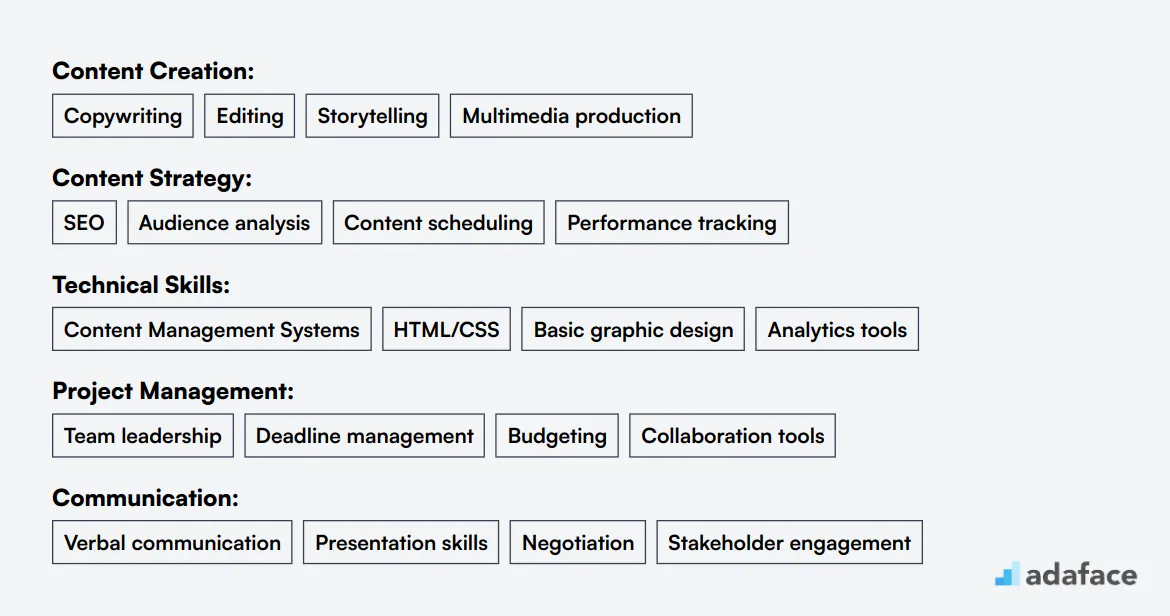
When manually screening resumes, focus on key terms related to content strategy, technical skills, and leadership. Look for mentions of SEO, content management systems, analytics tools, and team management experience.
To streamline the process, consider using AI-powered tools like ChatGPT or Claude. These can help you filter resumes based on specific criteria and provide a quick overview of each candidate's qualifications.
Here's a sample prompt for AI-assisted resume screening:
TASK: Screen resumes for Content Manager role
INPUT: Resumes
OUTPUT:
- Candidate name and email
- Matching keywords
- Score (out of 10)
- Recommendation
- Shortlist (Yes/No/Maybe)
KEYWORDS:
- Content strategy
- SEO
- CMS (WordPress, Drupal)
- Analytics
- Team management
- Copywriting
- Project management
- Digital marketing
Recommended Skills Tests to Screen Content Managers
To ensure you hire the best Content Managers, skills tests are a smart choice. They provide an objective measure of a candidate's abilities and help you identify the most suitable person for the role. Here are our top recommendations for assessing Content Managers:
Content Strategy Test: This test evaluates a candidate's understanding of content planning and execution. It helps you ensure that they can create, organize, and manage content that aligns with your business goals. Learn more about Content Strategy Test.
Copywriting Test: Assess whether candidates have the writing skills needed to produce engaging and persuasive content. This test is vital for identifying those who can craft compelling narratives and communicate your brand effectively. Explore Copywriting Test.
SEO Assessment Test: This test checks if your candidates understand search engine optimization essentials. It's crucial for ensuring your content reaches and resonates with the target audience. Discover more about SEO Assessment Test.
Communication Test: A Content Manager must be able to convey ideas clearly. This test evaluates their communication skills, ensuring they can interact effectively with team members and stakeholders. Find out about Communication Test.
Project Management Test: Since Content Managers often oversee projects, this test can help evaluate their ability to manage tasks, deadlines, and resources efficiently. Learn about Project Management Test.
Case Study Assignments to Evaluate Content Manager Candidates
Case study assignments can be valuable tools for assessing Content Manager candidates. However, they come with drawbacks like lengthy completion times, lower participation rates, and the risk of losing promising applicants. Despite these challenges, well-designed case studies can provide insights into a candidate's skills and problem-solving abilities.
Content Strategy Overhaul: This case study tasks candidates with analyzing a company's existing content strategy and proposing improvements. They should identify gaps, suggest new content types, and outline a plan for better content marketing alignment with business goals.
Social Media Campaign Planning: Candidates are given a fictional product launch scenario and asked to create a comprehensive social media campaign. This assignment tests their ability to craft engaging content, plan post schedules, and leverage different platforms effectively.
SEO Content Audit: In this case study, applicants review a website's content from an SEO perspective. They should identify optimization opportunities, suggest keyword strategies, and recommend content updates to improve search engine rankings and user experience.
How to Structure the Interview Stage for Hiring Content Managers
After candidates successfully pass the initial skills assessments, the next step is conducting in-depth interviews to evaluate their technical prowess. While skills tests are excellent for filtering out unfit candidates, the interview stage helps you identify the best fit for the role by testing their hard skills. Understanding the right questions to ask can make a significant difference in finding a great Content Manager.
Here are some sample interview questions tailored for content management roles: What strategies would you use to create a content calendar that aligns with company goals? This question gauges their planning ability and strategic alignment. Can you describe a time when you used data to improve content performance? This helps to assess analytical skills. How do you ensure consistency across different content types and platforms? is key to understanding their organizational capabilities. What tools or software are you proficient in for content management? is vital to gauge technical proficiency. Finally, How do you handle feedback from multiple stakeholders? tests their communication skills. For a more detailed understanding, explore our content manager interview questions.
What is the cost of hiring a Content Manager?
Hiring a Content Manager can vary widely based on location, experience, and industry. In the United States, salaries typically range from $43,334 to $113,451, with a median salary around $70,116. Other countries also show diverse salary structures, which will be detailed in the sections below.
Content Manager Salary in the United States
Based on recent data, the average salary for Content Managers in the United States ranges from $43,334 to $113,451, with a median of $70,116. These figures can vary significantly depending on factors such as location, experience, and company size.
For instance, Content Managers in Chicago, IL tend to earn higher salaries, with a median of $105,058, while those in Tulsa, OK have a lower median at $40,438. New York, NY and Washington, DC also offer competitive salaries, with medians of $89,862 and $86,308 respectively.
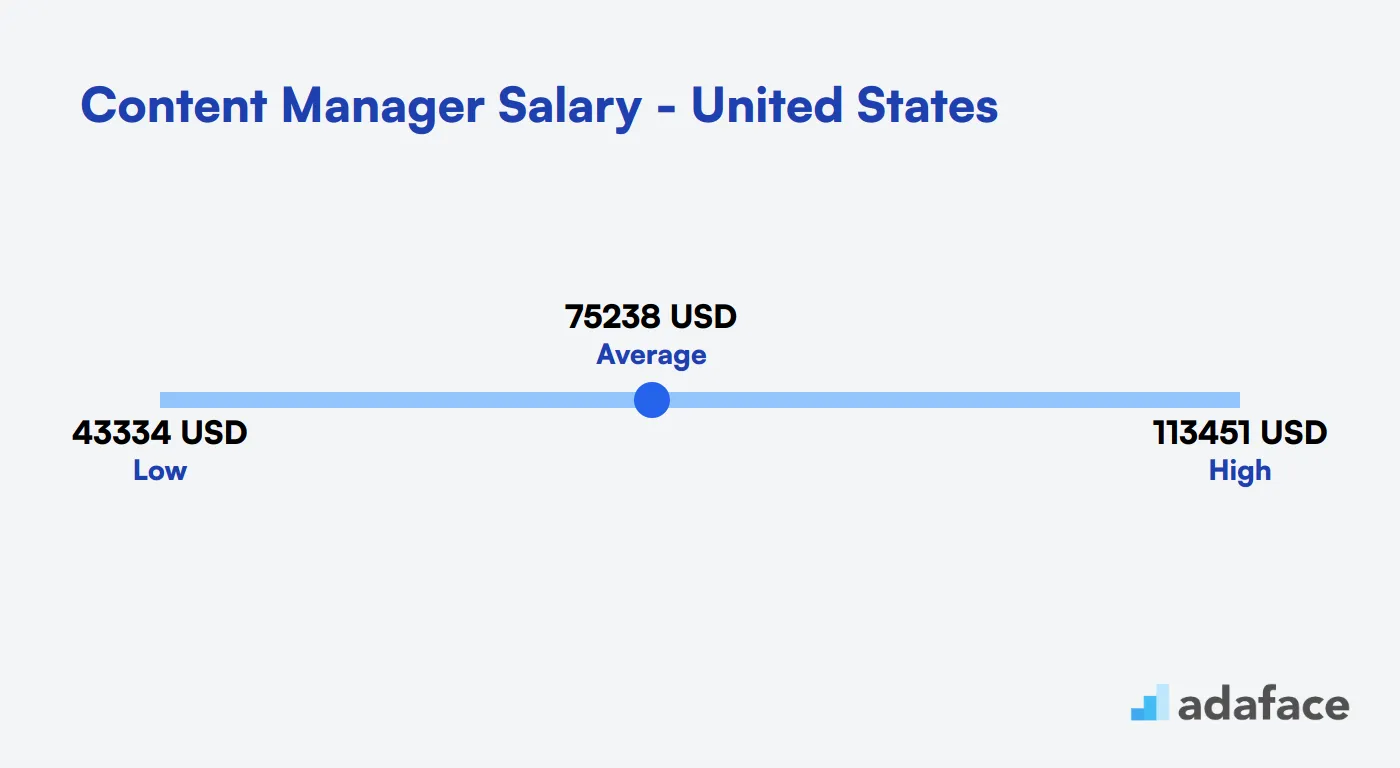
Content Manager Salary in the United Kingdom
In the United Kingdom, the average salary for a Content Manager is approximately £35,000 to £50,000 per year. Entry-level positions may start around £30,000, while experienced professionals can earn upwards of £65,000, especially in larger cities like London. These figures can vary based on the industry and specific company.
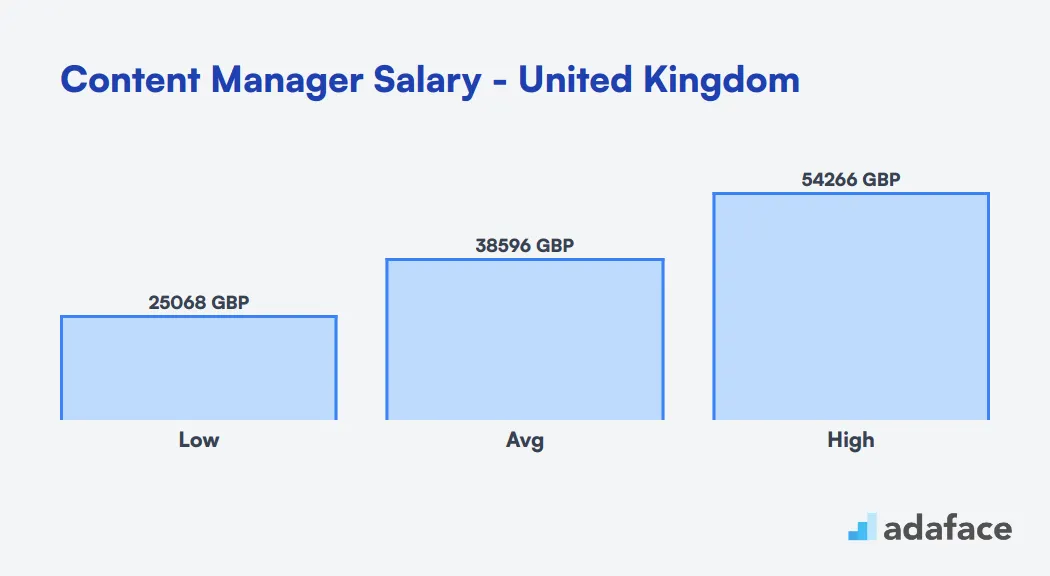
Content Manager Salary in Canada
In Canada, Content Managers can expect competitive salaries. The average annual salary ranges from CAD 46,731 to CAD 88,491, with a median of CAD 64,306.
Salaries vary by location. Toronto offers a mean salary of CAD 68,850, while Vancouver averages CAD 62,750. Ottawa shows the widest range, from CAD 30,915 to CAD 126,411 annually.
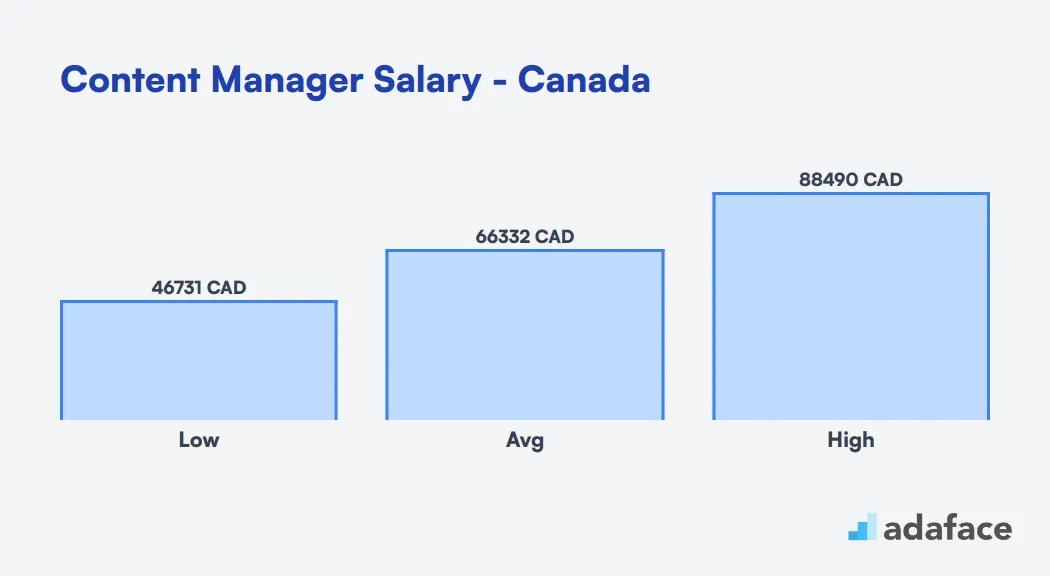
Content Manager Salary in India
Content Manager salaries in India vary based on location and experience. In Gurgaon, the average salary ranges from ₹5.5 lakhs to ₹23.7 lakhs per year, with a median of ₹11.4 lakhs. Bengaluru offers competitive pay, with salaries between ₹7.1 lakhs and ₹14.2 lakhs annually.
Other major cities like Chennai, Mumbai, and Delhi also provide good opportunities, with median salaries of ₹8.4 lakhs, ₹6 lakhs, and ₹5 lakhs respectively. Overall, the national median salary for Content Managers in India is approximately ₹5.1 lakhs per year.
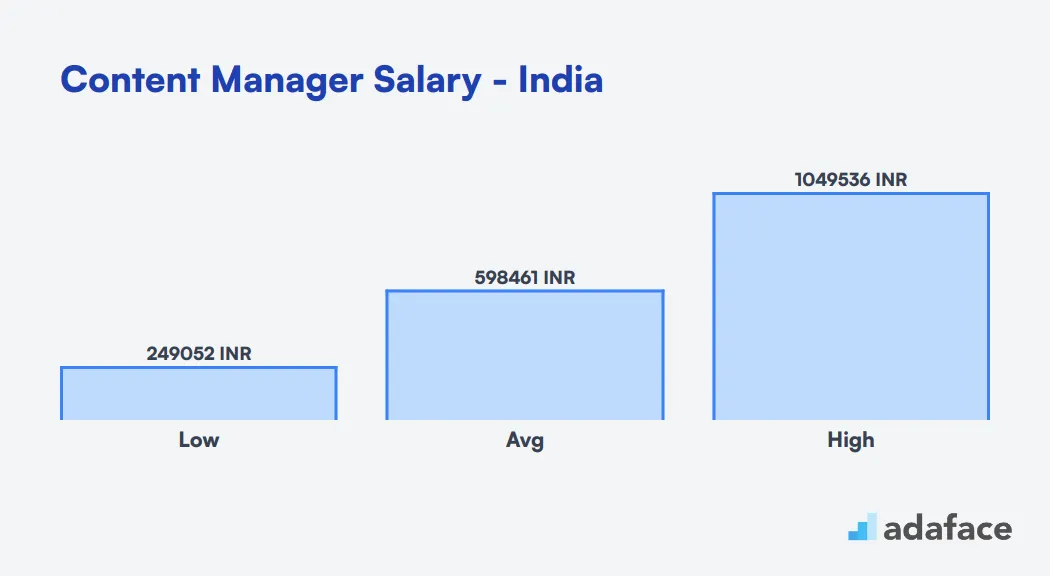
What's the difference between a Content Manager and a Content Strategist?
Many people often confuse the roles of a Content Manager and a Content Strategist. While both positions focus on content, they serve different purposes within an organization, leading to misunderstandings about their respective responsibilities.
A Content Manager typically handles the day-to-day content creation and management. Their tasks include editing, publishing, and ensuring that content aligns with branding. They often collaborate closely with writers and designers, focusing on content output and engagement rates.
In contrast, a Content Strategist is responsible for long-term content planning and overall strategy. This role involves conducting audience analysis, setting key performance indicators (KPIs), and making decisions related to content direction. They work with executives and cross-functional teams to drive ROI and audience growth.
| Content Manager | Content Strategist | |
|---|---|---|
| Focus | Day-to-day content creation and management | Long-term content planning and strategy |
| Scope of Work | Content creation, editing, publishing | Content strategy, audience analysis, KPI setting |
| Technical Skills | CMS proficiency, basic SEO | Analytics tools, content auditing, SEO expertise |
| Team Interaction | Collaborates with writers and designers | Works with executives and cross-functional teams |
| Key Metrics | Content output, engagement rates | ROI, audience growth, conversion rates |
| Decision Making | Content scheduling and distribution | Content direction and resource allocation |
| Experience Level | Entry to mid-level | Mid to senior-level |
| Typical Background | Journalism, English, Communications | Marketing, Business, Data Analysis |
What are the ranks of Content Managers?
Content management roles often overlap, making it challenging to distinguish between different positions. However, understanding the hierarchy can help recruiters and hiring managers find the right fit for their team. Let's explore the common ranks of Content Managers:
- Junior Content Manager: This entry-level position is responsible for creating and editing content, managing social media accounts, and assisting with content strategy. They typically work under the guidance of more experienced team members.
- Content Manager: At this level, professionals take on more responsibility in developing and implementing content strategies. They often oversee a team of writers, coordinate with other departments, and analyze content performance.
- Senior Content Manager: These experienced professionals lead content initiatives across multiple channels. They're involved in high-level strategy, budget management, and often act as a bridge between content teams and executive leadership.
- Head of Content: This role oversees all content operations within an organization. They're responsible for aligning content strategy with business goals, managing large teams, and collaborating with other department heads.
- Chief Content Officer (CCO): At the executive level, CCOs are responsible for the overall content vision and strategy of the company. They work closely with other C-suite executives to ensure content supports broader business objectives.
When hiring for these positions, it's crucial to assess candidates' skills thoroughly. Consider using content marketing interview questions to evaluate their expertise and fit for the specific role in your organization.
Hire the Best Content Managers
Throughout this guide, we've explored the role of a Content Manager, key skills, hiring processes, and evaluation methods. We've covered everything from crafting job descriptions to conducting interviews, ensuring you have a solid foundation for your hiring journey.
The most important takeaway is to use well-crafted job descriptions and skills tests to make your hiring process accurate and effective. By implementing these strategies, you'll be well-equipped to find and hire top-notch Content Managers who can drive your content strategy forward and deliver results for your organization.
Content Strategy Test
FAQs
Look for a bachelor's degree in marketing, communications, or a related field, along with 3-5 years of experience in content creation and management. Key skills include strong writing and editing abilities, SEO knowledge, project management, and familiarity with content management systems.
Use content strategy tests and SEO assessment tests to evaluate technical skills. Additionally, ask for portfolio samples and case studies of successful content campaigns they've managed.
Ask about their content strategy approach, experience with different content types, methods for measuring content success, and how they stay updated with industry trends. For a comprehensive list, check our Content Manager interview questions guide.
While industry experience can be beneficial, it's not always necessary. Look for candidates with a proven track record of quickly learning and adapting to new industries. Strong research skills and the ability to translate complex topics into engaging content are often more valuable.
A Content Manager should be familiar with content management systems (CMS), SEO tools, analytics platforms (e.g., Google Analytics), project management software, and basic design tools. Proficiency in social media management tools is also valuable.
Use situational interview questions to assess their approach to team management, conflict resolution, and project coordination. Ask about their experience leading content teams and managing freelancers or agencies.
Provide a real or hypothetical content challenge and ask them to outline a strategy. This could include developing a content calendar, proposing ideas for a new product launch, or suggesting improvements to an existing content strategy. Evaluate their ability to align content with business objectives and target audience needs.

40 min skill tests.
No trick questions.
Accurate shortlisting.
We make it easy for you to find the best candidates in your pipeline with a 40 min skills test.
Try for freeRelated posts
Free resources



